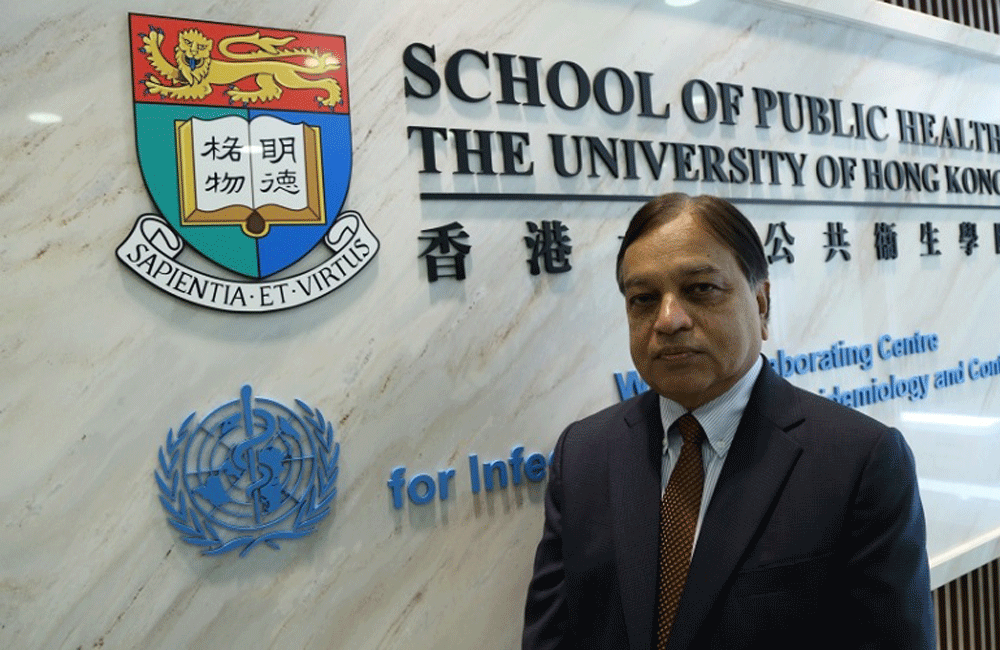Renowned Sri Lankan pathologist and virologist Professor Malik Peiris says that it is not possible for a COVID-19 infected patient to infect another person with the virus after 10 days from the onset of symptoms. Professor Peiris, the Chair of Virology at the University of Hong Kong, further pointed out that the Antigen test is the most appropriate method to identify infected persons who have the potential to infect another person with the virus.
Professor Peiris, who is currently in Sri Lanka, made these observations while attending a panel discussion recently organised by the Ceylon College of Physicians. He had provided the following responses to several questions put forward to him.
Question: This disease has created great fear and uncertainty among the public. At the same time, the spread of some of the myths created around the virus through social media has made the situation worse. What is the scientific background behind this virus?
Answer: When considering the transmission of the disease, it has been found that 44% of transmissions from an infected person to another person happen before the relevant infected person shows any symptoms. Although the virus could transmit within 3-4 days after that, the ability to transmit the virus rapidly declines after 5 to 7 days.
Question: How is the COVID-19 virus identified? We commonly use PCR tests. How is it carried out? What are the limiting factors of PCR testing?
Answer: When comparing PCR tests and Antigen tests with each other, the ability to identify the nucleic acidity of the virus is relatively high with PCR testing. However, if you want to identify the type of virus that can spread the disease, then the patient must have a very large amount of the virus in their body. The correlation between that and PCR testing is a low one. In other words, every positive PCR test does not mean that everyone has the amount of virus to infect.
Despite the fact that the sensitivity of the Antigen test is lower than PCR test in some manner, it allows to identify patients with high levels of the virus. The correlation between antigen testing and infections is a better one. Although some of the antigen tests used in the early stages were not in good condition, the antigen tests later introduced with the approval of the World health Organization (WHO) can be called very good. We must be able to use both of these types of tests correctly for the relevant purpose.
Question: For whom and at what point should these tests be used?
Answer: Due to the high sensitivity of PCR tests, it is the best choice to diagnose the disease from a patient. At the same time, when you have to make quick decisions and when a facility with PCR testing capabilities is very far away, fast results can be achieved through antigen testing. It gives you a chance to make a decision.
Also, antigen tests are sufficient to identify individuals who are highly infected with the virus, with the aim of reducing the spread of the disease. Because it's fast and it indicates patients with a higher viral load.
Question: Can a patient identified as COVID-19 positive through PCR testing become someone who does not infect another person with the virus? Can you explain this?
Answer: As I said before, the PCR test does not identify the infectious virus components that make up the entire virus. It focusses only on the genetic material of the virus. Even when it has reached a non-infectious level from one person to another, the genetic material of the virus can remain in the patient's body for a long time.
Due to this, the recommendations of the World Health Organization have now been changed. Basically, what they are saying is that patients who are asymptomatic and patients with mild symptoms cannot infect another person after 8-10 days since being infected. So, you do not have to do a PCR test. Even if the PCR test is positive, it does not mean that he can transmit the disease to another person. According to epidemiology and according to studies on identification of close contacts, it has been revealed that the disease is no longer contagious 5-6 days after the onset of symptoms.
Professor Peiris, who received his medical undergraduate training at the University of Peradeniya, is currently a leading virologist in the world. He was elected a Fellow of the Royal Society of London in 2006 and together with his co-workers, he has published more than 600 scientific papers in a research career spanning more than 35 years. He is credited with 32 scientific patents relating to diagnosis of viral infections.
In 2003, he played a key role in the discovery that a novel coronavirus was the cause of severe acute respiratory syndrome, or SARS and in understanding the pathogenesis of this new disease. He also carried out important research on the Middle Eastern Respiratory Syndrome (MERS) Coronavirus outbreak in 2015.
He was awarded the Chevalier de la Légion d'honneur, France (2007), Mahathir Science Award, Akademi Sains, Malaysia (2007) and Silver Bauhinia Star (S.B.S.), Hong Kong SAR (2008).
Prof. Peiris is currently the Chair of Virology and Tam Wah Ching Professor in Medical Science at School of Public Health, The University of Hong Kong.

Leave your comments
Login to post a comment
Post comment as a guest